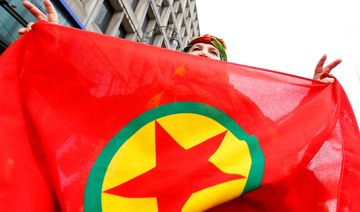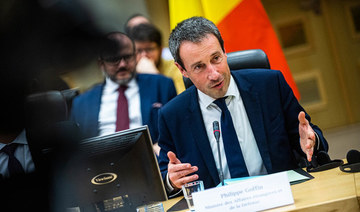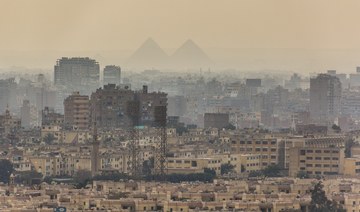SULAIMANIYAH/Iraq: Turkey and Iran are increasingly adopting “game-changing” drones as their weapon of choice against Kurdish rebels in northern Iraq, prompting fears for the safety of civilians and stoking geopolitical tensions.
“Not a day goes by without us seeing a drone,” said Mohammad Hassan, mayor of Qandil, the mountainous Iraqi stronghold of Turkey’s outlawed Kurdistan Workers’ Party (PKK).
“They fly so low Qandil’s residents can see them with their naked eye,” Hassan told AFP.
The PKK has used Qandil for decades as a rear-base for its insurgency against the Turkish state.
The Democratic Party of Iranian Kurdistan (PDK-I) has similar rear-bases in other remote areas of Iraqi Kurdistan, from which it launches attacks across the border into Iran.
Turkey and Iran consider the Kurdish rebels as “terrorists” and routinely conduct cross-border ground assaults, air strikes and artillery bombardments against their Iraq bases.
Starting in 2018, both countries began using unmanned aerial vehicles (UAVs) for surveillance and even targeted assassinations in northern Iraq.
Drone use has expanded dramatically since Turkey launched a new assault in June, analysts and residents of affected areas told AFP.
Activists said dozens of border villages and adjacent farms have been abandoned by their terrified residents.
The drone strikes have also prevented thousands of Yazidis from returning to their homes in Sinjar district, close to the Syrian border, where PKK elements now have a presence.
“The Turkish bombing causes so much terror, so Yazidis are not coming home,” Sinjar Mayor Mahma Khalil told AFP.
Despite public criticism, Turkey has continued its drone warfare — likely because of new strides against the PKK.
For years, the PKK sheltered in Iraq’s mountains, where manned warplanes and ground troops struggled to reach them.
But drones have allowed Ankara to track, identify and eliminate PKK targets within minutes, Nicholas Heras of the Institute for the Study of War told AFP.
“Turkey’s use of military drones in northern Iraq has been a game-changer in its war against the PKK,” he said.
Ankara is now swapping expensive fighter-bombers like the US F-16 for drones like the domestically-produced Bayraktar TB2, which has better surveillance, can fly for 24 hours and is cheaper — so “expendable” if downed by the PKK, said Turkish drone expert Sibel Duz.
In an exclusive interview in Qandil, PKK spokesman Zagros Hiwa told AFP Turkey had created a 15 km buffer zone in northern Iraq with the help of its drones.
“Our forces have downed seven drones this year,” he said, declining to provide details of PKK losses.
The PKK has had limited success with improvised drones of its own, commercial models fitted with explosives.
A US source familiar with Turkey’s drones program said US special operations forces in northern Iraq were bristling at the new “frequency and intensity” of strikes.
“The Turks are overflying US positions with armed assets, which is a no-no. There is general mistrust and irritation over all this,” the source said.
Iran first began deploying aircraft fitted with cameras during its 1980-88 war with Iraq.
The newer MoHajjer-6 and Shahed-129 are Tehran’s weapons of choice for northern Iraq, said Adam Rawnsley, who tracks Iranian drones for the Foreign Policy Research Institute.
“The way Iran is using drones against Kurdish targets in Iraq is 180 degrees different than how they use drones everywhere else. It’s much more sophisticated,” he said.
In a rare interview this spring, the head of Tehran’s drone division Col. Akbar Karimloo told local media Iran uses the aircraft for both surveillance and attack, and to provide forward observation for artillery and missile launchers.
Earlier this month, Iran said it would “take coordinated steps” with Turkey to counter Kurdish rebel activity along its borders. It did not specifically mention drones.
Baghdad and Kurdish authorities have said little on the expanding drone campaigns, and Iraqi officials have told AFP privately they have no leverage over Turkey or Iran.
After a Turkish drone strike killed two top Iraqi officers in the north in August, Baghdad expressed outrage but did not pressure Ankara.
“The general problem Iraq has is that larger powers tend to use it as a shooting gallery,” Rawnsley told AFP.
Wim Zwijnenburg, who works on disarmament for Dutch peace organization PAX, said avenues for recourse were limited.
“A lot of these strikes are in areas which are not very populated, so there’s little information from people or journalists on the ground,” he said.
Indeed, neither activists nor officials could provide a specific death toll from drone strikes in the north.
“That only adds to the obscurity of the drone campaigns,” Zwijnenburg told AFP.
Turkey, Iran deploy drones in north Iraq against Kurd rebels
https://arab.news/p9882
Turkey, Iran deploy drones in north Iraq against Kurd rebels

- The PKK has used Qandil for decades as a rear-base for its insurgency against the Turkish state
Egypt braces for second summer of power cuts as gas supplies dwindle

- The cuts started as Egypt allocated more of its gas production for export to raise scarce dollars, importing polluting fuel oil to keep some power stations running
CAIRO: Among the bustling workshops of central Cairo’s Al-Sabtiyah district, Om Ghada’s blacksmith business has seen profits dip as two-hour power cuts each day returned after a brief suspension during the holy month of Ramadan.
When scheduled outages began last summer it came as a shock to Egyptians accustomed to years of reliable power supplies under President Abdel Fattah El-Sisi, and the government promised they would be temporary.
But supplies of the natural gas that helped generate an electricity surplus are dwindling and the power cuts are back.
The outages “create a lot of obstacles and cut into my profit,” said Om Ghada, as sparks flew from a metal cutter nearby. She owns the workshop, which is among dozens in the area that rely on electricity to power machines.
“One customer yesterday waited two hours, until they became impatient and left,” she said.
While Egypt recently secured record investments from the United Arab Emirates and an expanded IMF program, easing a foreign currency crisis, power cuts are a reminder of underlying economic challenges.
The cuts started as Egypt allocated more of its gas production for export to raise scarce dollars, importing polluting fuel oil to keep some power stations running. The government initially blamed them on high temperatures, but they continued through 2023 after summer ended even after the government paused exports to meet demand.
Egypt has been seeking a role as a regional energy exporter, eyeing electricity sales to countries including Saudi Arabia and Libya, planning an interconnector to Greece, and shipping Liquefied Natural Gas (LNG) cargoes from two liquefaction plants.
But development of renewables has been halting and gas supplies are in doubt because of a lack of large discoveries since the giant Zohr field in 2015. That pushed gas production in 2023 to its lowest level since 2017, and the government recently started importing LNG cargoes.
Officials have blamed power cuts on rising demand from a growing population of 106 million, mega-projects backed by El-Sisi, and urban development.
Cuts to electricity subsidies have been slowed as the economy came under pressure in recent years.
Egypt’s electricity ministry did not immediately respond to a request for comment.
SALES DOWN
The power cuts were suspended over Ramadan and the Eid holiday that followed, and local media said they would also be halted for labor day and spring holidays going over this weekend. But they are sometimes hard to predict and are hurting small businesses that play a crucial role in an economy where growth has slowed and is expected to ease to 2.8 percent in the current financial year ending in June, from above 4 percent last year.
Ahmed Hussein, an air conditioning technician in Al-Sabtiyah, said daytime power cuts reduced productivity by 40 percent. South of central Cairo in the Sayeda Zeinab neighborhood, Essam said sales at the dessert shop where he works were down 30 percent since the regular power cuts began.
“As long as there’s no electricity there are no sales. The safe and the till aren’t working,” Essam, who didn’t give his last name, said. “Customers can’t see anything.”
Sales of generators are up, but many can’t afford them.
The cuts have drawn ire on social media, where some have complained about being stuck in elevators, or unable to use them, and others have bemoaned the lack of air conditioning in hotter areas in southern Egypt.
At the launch of a state-run cloud computing data center this week, El-Sisi encouraged citizens to focus on developing sectors like information technology, saying “this needs brains, not a factory or anything else.”
But as one social media post quipped in response: “This needs electricity and unlimited Internet.”
Rafah incursion would put hundreds of thousands of lives at risk, UN aid agency says

- Leaders internationally have urged Israeli Prime Minister Benjamin Netanyahu to be cautious
- US Defense Secretary Lloyd Austin said any US response to incursion would be up to President Biden
GAZA: The United Nations humanitarian aid agency says hundreds of thousands of people would be “at imminent risk of death” if Israel carries out a military assault in the southern Gaza city of Rafah.
The city has become critical for humanitarian aid and is highly concentrated with displaced Palestinians.
Leaders internationally have urged Israeli Prime Minister Benjamin Netanyahu to be cautious about any incursion into Rafah, where seven people — mostly children — were killed overnight in an Israeli airstrike.
On Thursday, US Defense Secretary Lloyd Austin said any US response to such an incursion would be up to President Joe Biden, but that currently, “conditions are not favorable to any kind of operation.”
Turkiye’s trade minister said Friday that its new trade ban on Israel was in response to “the deterioration and aggravation of the situation in Rafah.”
The Israel-Hamas war has driven around 80 percent of Gaza’s population of 2.3 million from their homes, caused vast destruction in several towns and cities, and pushed northern Gaza to the brink of famine.
The death toll in Gaza has soared to more than 34,500 people, according to local health officials, and the territory’s entire population has been driven into a humanitarian catastrophe.
The war began Oct. 7 when Hamas attacked southern Israel, abducting about 250 people and killing around 1,200, mostly civilians. Israel says militants still hold around 100 hostages and the remains of more than 30 others.
Dozens of people demonstrated Thursday night outside Israel’s military headquarters in Tel Aviv, demanding a deal to release the hostages. Meanwhile, Hamas said it would send a delegation to Cairo as soon as possible to keep working on ceasefire talks. A leaked truce proposal hints at compromises by both sides after months of talks languishing in a stalemate.
Across the US, tent encampments and demonstrations against the Israel-Hamas war have spread across university campuses.
More than 2,000 protesters have been arrested over the past two weeks as students rally against the war’s death toll and call for universities to separate themselves from any companies that are advancing Israel’s military efforts in Gaza.
Iraqi militant group claims missile attack on Tel Aviv targets, source says

- The attack was carried out with multiple Arqub-type cruise missiles
BAGHDAD: The Islamic Resistance in Iraq, a group of Iran-backed armed groups, launched multiple attacks on Israel using cruise missiles on Thursday, a source in the group said.
The source told Reuters the attack was carried out with multiple Arqub-type cruise missiles and targeted the Israeli city of Tel Aviv for the first time.
The Islamic Resistance in Iraq has claimed dozens of rockets and drone attacks on US forces in Iraq and Syria and on targets in Israel in the more than six months since the Israel-Hamas war erupted on Oct. 7.
Israel has not publicly commented on the attacks claimed by Iraqi armed groups.
15 pro-government Syrian fighters killed in Daesh attacks: monitor

- It is the latest attack of its kind by remnants of the jihadists
BEIRUT: Daesh group militants killed at least 15 Syrian pro-government fighters on Friday after they attacked three military positions in the Syrian desert, a war monitor said.
It is the latest attack of its kind by remnants of the jihadists.
They “attacked three military sites belonging to regime forces and fighters loyal to them... in the eastern Homs countryside, triggering armed clashes... and killing 15” pro-government fighters, the British-based Syrian Observatory for Human Rights said.
Daesh overran large swathes of Syria and Iraq in 2014, proclaiming a so-called caliphate and launching a reign of terror.
It was defeated territorially in Syria in 2019, but its remnants continue to carry out deadly attacks, particularly against pro-government forces and Kurdish-led fighters in the vast desert.
Daesh remnants are also active in neighboring Iraq.
Last month, Daesh fighters killed 28 Syrian soldiers and affiliated pro-government forces in two attacks on government-held areas of Syria, the Observatory said.
Many were members of the Quds Brigade, a group comprising Palestinian fighters that has received support from Damascus ally Moscow in recent years, according to the Observatory, which has a network of sources inside Syria.
In one of those attacks, the jihadists fired on a military bus in eastern Homs province, the Observatory said at the time.
Separately, six Syrian soldiers died in an Daesh attack against a base in eastern Syria, it added.
Syria’s war has claimed the lives of more than half a million people and displaced millions more since it erupted in March 2011 with Damascus’s brutal repression of anti-government protests.
It then pulled in foreign powers, militias and jihadists.
In late March, Daesh militants “executed” eight Syrian soldiers after an ambush, the monitor said at that time.
The jihadists also target people hunting desert truffles, a delicacy which can fetch high prices in the war-battered economy.
The Observatory in March said Daesh had killed at least 11 truffle hunters by detonating a bomb as their car passed in the desert of Raqqa province in northern Syria.
In separate unrest in the country, Syria’s defense ministry earlier on Friday said eight soldiers had been injured in Israeli air strikes near Damascus.
The Observatory said Israel had struck a government building in the Damascus countryside that has been used by Lebanon’s Iran-backed Hezbollah group since 2014.
The Israeli military has carried out hundreds of strikes in Syria since the outbreak of Syria’s civil war, mainly targeting army positions and Iran-backed fighters.
Prominent Gaza doctor killed by torture in Israeli detention

- Al-Bursh died in Ofer Prison, an Israeli-run incarceration facility in the West Bank, says the Palestinian Prisoners Society
GAZA: Adnan Al-Bursh, a Palestinian surgeon and former head of orthopedics at Gaza’s Al-Shifa medical complex, was killed on April 19 under torture in Israeli detention.
According to a statement from the Palestinian Prisoners Society, Al-Bursh, 50, died in Ofer Prison, an Israeli-run incarceration facility in the West Bank.
His body remains held by the Israeli authorities, according to the Palestinian Civil Affairs Committee.
The Palestinian Prisoners Society described the doctor’s death in Israeli custody as “assassination.”
Al-Bursh, who was a prominent surgeon in Gaza’s largest hospital Al-Shifa, was reportedly working at Al-Awada Hospital in the northern Gaza Strip when he was arrested by Israeli forces.
The Israeli prison service declared Al-Bursh dead on April 19, claiming the doctor was detained for “national security reasons.”
However, the prison’s statement did not provide details on the cause of death. A prison service spokesperson said the incident was being investigated.
Francesca Albanese, the UN special rapporteur on the occupied Palestinian territories, said on Thursday she was “extremely alarmed” at the death of the Palestinian surgeon.
“I urge the diplomatic community to intervene with concrete measures to protect Palestinians. No Palestinian is safe under Israel’s occupation today,” she wrote on X.
I am extremely alarmed by information that Dr. Adnan Albursh, a well-known surgeon at #alshifa_hospital, has died while detained by Israeli forces in the Ofer military prison. While I acquire more information, I URGE the diplomatic community to intervene with CONCRETE MEASURES to…
— Francesca Albanese, UN Special Rapporteur oPt (@FranceskAlbs) May 2, 2024
Since Oct. 7, when Israel launched its retaliatory bombing campaign in the Gaza Strip, the Israeli military has carried out over 435 attacks on healthcare facilities in the besieged Palestinian enclave, killing at least 484 medical staff, according to UN figures.
However, the health authority in Gaza said in a statement that Al-Bursh’s death has raised the number of healthcare workers killed in the ongoing onslaught on the strip to 496.
Palestinian prisoner organizations report that the Israeli army has detained more than 8,000 Palestinians from the West Bank alone since Oct. 7. Of those, 280 are women and at least 540 are children.






















